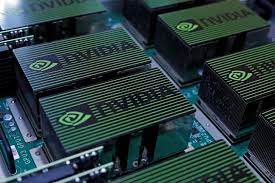To fulfill the increasing customer demand for AI applications, Nvidia Corp announced on Monday that it was building Israel’s most potent artificial intelligence (AI) supercomputer.
The most valuable chip business in the world by market capitalization, Nvidia, predicted that the cloud-based system would cost hundreds of millions of dollars and only be partially operational by the end of 2023.
Nvidia collaborated with tens of thousands of software engineers and 800 companies in Israel, according to Gilad Shainer, senior vice president of Nvidia.
One of the fastest AI supercomputers in the world, Israel-1 is anticipated to provide a performance of up to eight exaflops of AI computation. One exaflop has the capacity to carry out 1 quintillion computations per second, or 1,000,000,000,000,000,000.
Shainer claimed that artificial intelligence (AI) was the “most important technology in our lifetime” and that big graphics processing units (GPUs) were required to build AI and generative AI applications.
“Generative AI is currently pervasive. You must be able to perform training operations on huge datasets, he told reporters, saying that Israeli businesses will soon have access to a supercomputer that they do not currently have.
They will be able to train more quickly, create frameworks, and create solutions that can deal with more complicated challenges thanks to this large-scale system.
As an illustration, thousands of Nvidia GPUs were used to build OpenAI’s ChatGPT.
The former Mellanox team created the system. In 2019, Nvidia outbid Intel Corp. to acquire Israeli chip designer Mellanox Technologies for close to $7 billion.
Nvidia’s Israeli partners were, according to Shainer, the company’s top goal for the supercomputer. In the future, “We might use this system to work with partners outside of Israel,” he said.
Nvidia announced last week that it had collaborated with the University of Bristol in Britain to develop a new supercomputer that would compete with Intel and Advanced Micro Devices Inc. using a new Nvidia chip.

















